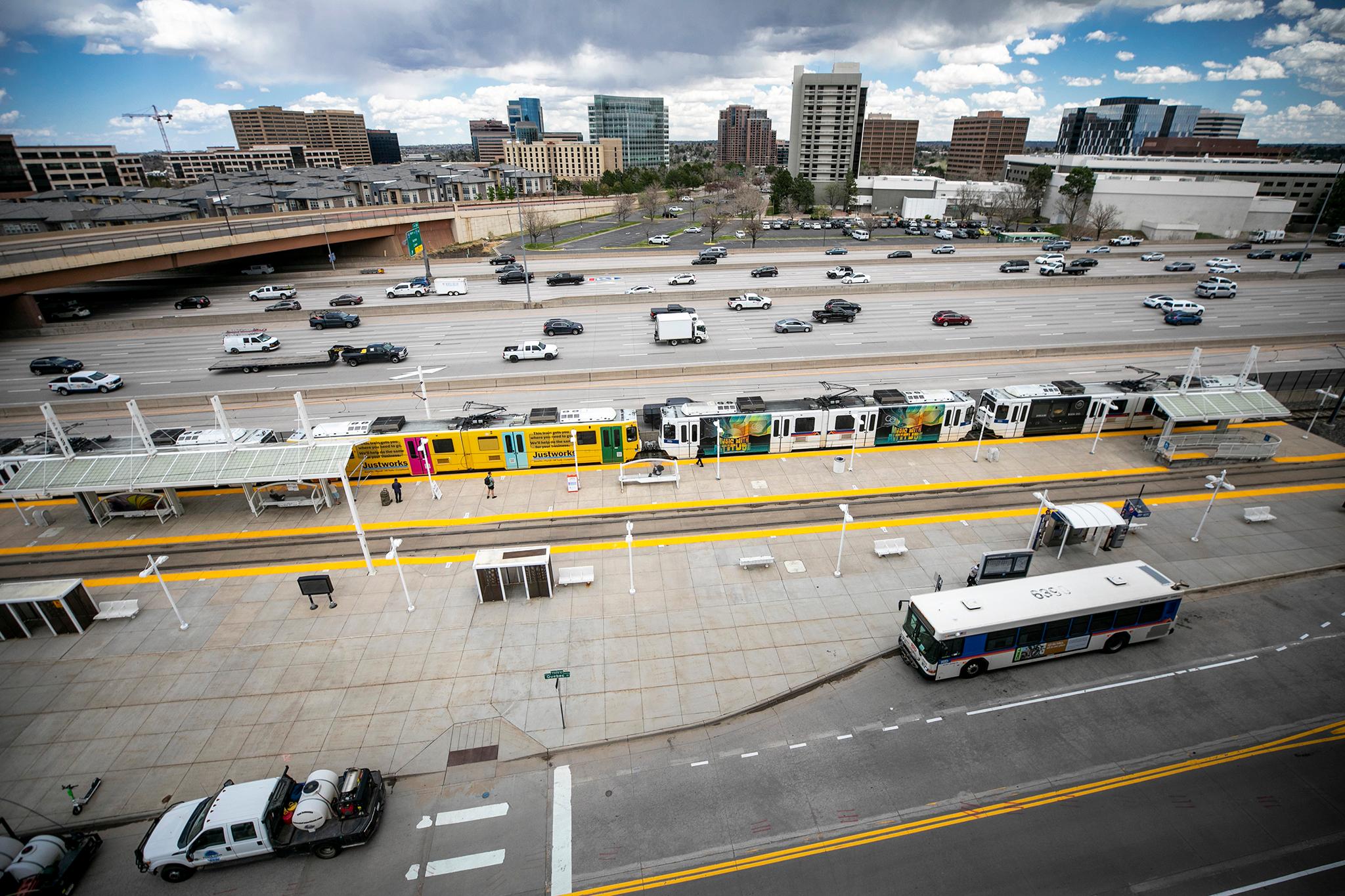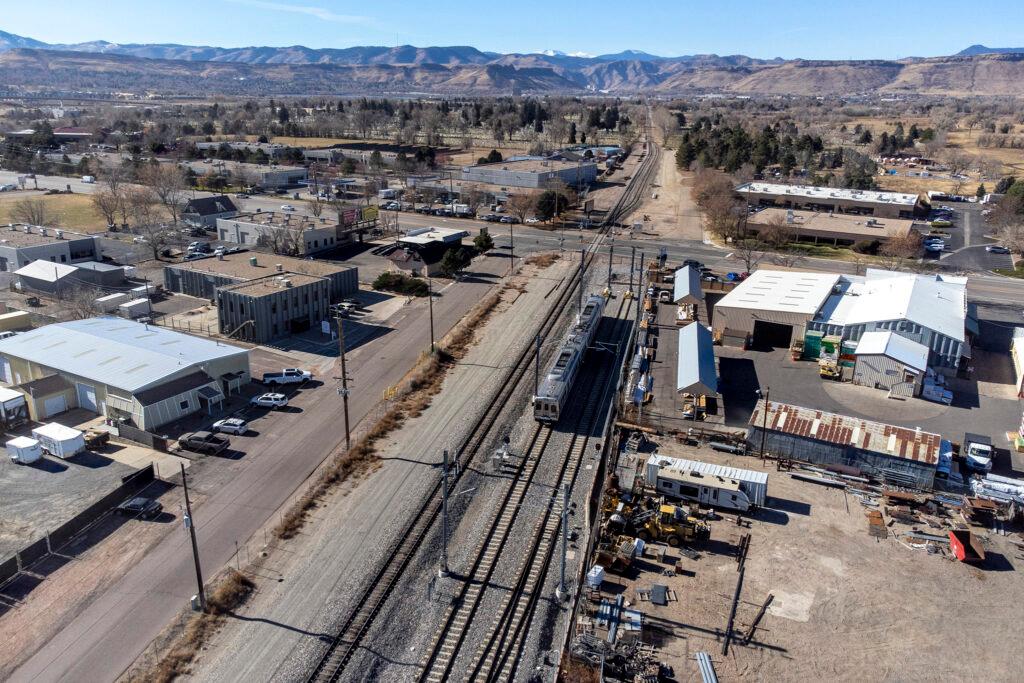
Colorado's Democratic leaders want to see more apartments and condos go up near bus routes and train stations. A proposal at the state legislature would push cities to allow denser construction in those “transit-oriented” areas.
But there’s a big, controversial question at the heart of the proposal: Should the state make cities change their zoning rules? And how?
Backers of HB24-1313 say yes. Their bill would use the state’s financial power to bring cities into line.
If a local government doesn’t allow dense development near transit lines, it would lose access to an important source of state funding. It could be cut off from the Highway Users Tax Fund, or HUTF, which provides millions of dollars per year for cities to use on transportation infrastructure.
The sponsors say that's a fair way to encourage cities to build housing. Opponents say that it could block cities from a key source of state funding.
“We believe this is not only regulatory overreach, but potentially dangerous for the traveling public. These funds are used to repair potholes, repave streets, do striping and replace guardrails and streetlights, and plow roads during the winter snowstorms,” said Eric Bergman of Colorado Counties Inc., in a committee hearing.

More than $100 million a year is at stake
Colorado’s cities are expected to receive about $151 million in HUTF funding this year, according to the Colorado Municipal League. It comes from money the state collects from automobile-related taxes and fees.
For some of the largest cities, it’s worth tens of millions of dollars each. They can spend the money on causes like roads, bridges, traffic control, and planning.
HB24-1313 would take that money away if cities don’t achieve “housing opportunity goals.”
It all comes down to a math equation. The bill sets a target number of housing units for each city, based on how many miles of high-frequency bus and train lines cross the city. The cities would then have to ensure that they have “zoning capacity” for that level of density near transit lines — basically, that their own development rules aren’t preventing builders from reaching those targets. The bill’s supporters argue that apartments and condos near transit is the most sustainable, efficient way to add housing.
The rules would apply to most Front Range cities and to Grand Junction, assuming they have what qualifies as high-frequency bus or rail service. Some metro-area suburbs have claimed this means they would have to upzone to allow developers to build up to 10,000 or more new housing units.
And if they fail to hit the state-mandated housing goals, those communities would eventually lose access to their highway user dollars.
“Simply asking nicely isn't going to work with everyone,” said Rep. Steven Woodrow, a Democratic sponsor of the measure. “ … Some communities are working really hard and doing the right thing. And it's not equitable or fair to them to keep shouldering their share of the burden of a state's housing burden, while other communities just say we're not going to participate.”
Rep. Iman Jodeh, Sen. Faith Winter, and Sen. Chris Hansen, all metro area Democrats, are also cosponsors.
'The right balance' or a 'two-by-eight upside the head'?
The bill’s backers say that taking HUTF money from cities is a last resort. If they’re found noncompliant, cities would have up to six months to change their ways and get their HUTF dollars back.
The measure also includes some incentives — including hundreds of millions of tax credits to incentivize affordable housing in transit-served areas.
“We’re trying to strike the right balance,” Woodrow said.
Kurt Nordbeck, a member of the city of Boulder’s planning board, said the bill would promote smart development.
“We have forward-thinking and responsible housing policies in our comprehensive plan, but we have not adequately translated those into zoning,” he said. “Boulder needs this bill in order to help us better align our zoning with our aspirations, and better meet our housing needs.”

Opponents of the bill say it’s not just the money, it’s also the question of local authority. They say the state shouldn’t be playing in local zoning decisions, arguing that city leaders know best about the wants and needs of their communities.
“This is not even a stick,” said Rep. Lisa Frizell, a Republican, in a recent committee hearing. It’s “like a two-by-eight upside the head.”
Incentives vs. punishments
The funding fight feeds into one of the most controversial issues at the legislature: whether the state should override local control of land-use policies. Historically, local governments have made almost all the decisions about what can be built, and where.
Gov. Jared Polis has led the charge to change that, arguing that Colorado’s cities have made it too hard to build housing.
If the state government wants to influence those local decisions, it has a range of options, from “sticks” (or mandates) to “carrots” (or incentives). The options include:
- Mandatory changes:
- Originally, the sponsors of HB24-1313 considered using the state’s legal power to directly override local governments. If governments failed to hit their housing zoning goals, the state would forcibly institute new zoning laws. But the backers decided against this, finding there wasn’t enough political support.
- Financial incentive approach:
- Instead of forcing cities to make changes, the state could offer rewards for those who do. This is the preferred approach of the Colorado Municipal League. For example, SB24-174, a bipartisan measure, would “prioritize” cities for state grants if they complete housing needs assessments.
- Financially punitive approach.
- This is part of the approach proposed in HB24-1313. Rather than offering new money, the state could take away existing funds. (The measure also includes some incentives too.)
Blocking highway dollars is drawing stiff Republican opposition. More importantly, when it comes to the proposal’s viability, the HUTF proposal is dividing Democrats in the Senate.
Taking away HUTF money is “a really big stick. We want municipalities and counties to be able to rely on funds that are coming through and have some sort of certainty,” said Sen. Kyle Mullica, an Adams County Democrat, in an interview. “It’s definitely one big issue I've heard from my local communities.”
If the HUTF provision were to be removed, the law still could include legal requirements for cities to revise their zoning, but the state would have one less option to gain compliance.
Mullica may have strong leverage to make changes to the bill. He serves on the Finance Committee. If the bill is sent to Finance, Mullica could force changes to the bill, since it will likely require the support of all three Democrats on the panel.
But it’s unclear whether Senate leaders actually will send the bill to Mullica’s committee. It’s headed first to the Senate Transportation, Housing & Local Government Committee on Tuesday.
- New bill could force Colorado cities to allow density near transit lines
- Colorado landlords will have to offer lease extensions as Gov. Polis signs ‘for cause’ evictions bill
- Controversial development gets the green light from the Colorado Springs Planning Commission
- After failed land use bill, Gov. Polis aims to link climate, housing and transit — and tie state funding to RTD overhaul









